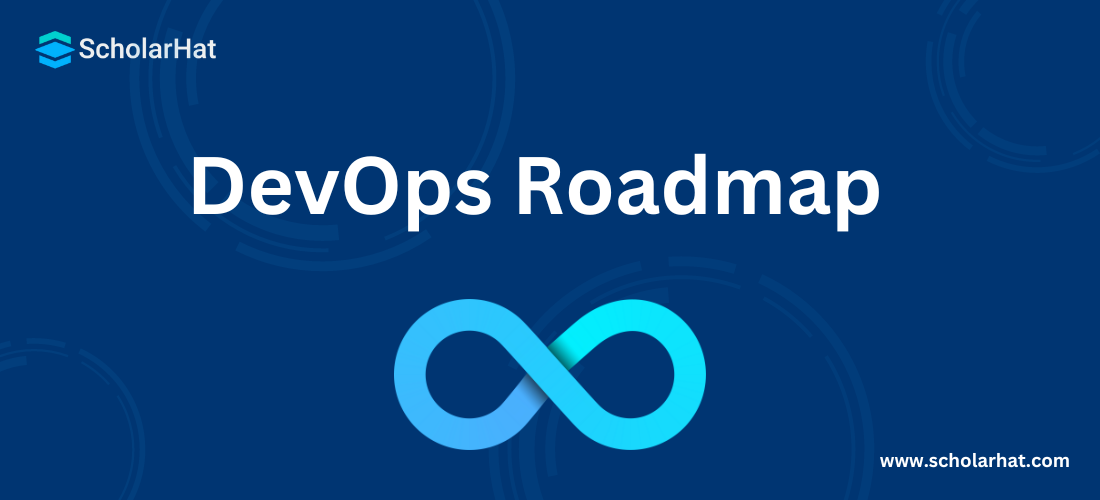10
meiDevOps Roadmap to Become DevOps Engineer
DevOps Roadmap
DevOps which is an acronym for 'Development' and 'Operations', is a set of practices serving as a bridge between the development and operations team. Advancements in cloud technologies, automation, and CI/CD are reshaping the DevOps landscape, requiring a strong and flexible skill set.
Are you the one looking for a career opportunity in this dynamic field? Are you passionate about evolving practices, and technologies and willing to work in a collaborative environment? Many such questions will be answered today in this DevOps Tutorial. The roadmap will take you step by step toward your goal. It will also help you figure out, whether your interest actually lies here or not. So don't miss out on such an important career growth step.
To explore different concepts of DevOps in detail, consider enrolling in our Azure DevOps Certification Training.
Read More: Top 50 DevOps Interview Questions and Answers
Who is a DevOps Engineer?
A DevOps Engineer is a professional who uses a certain set of DevOps practices and principles. They work to enhance collaboration among Software Development and IT Operations teams. Such a role requires the knowledge of both fields. They combine all the skills to produce smoother software delivery processes.
- DevOps Engineers use various techniques such as automation and integrating methods to make the process of building, testing, and deploying easier.
- They are also responsible for creating tools, and setting up infrastructure.
A DevOps Engineer is a part of various teams they are working with towards a common goal.
DevOps Engineer Prerequisites and Qualifications
Academic Degrees
While educational backgrounds may vary when you are aiming for a DevOps Engineer role, certain degrees are beneficial. Some of them are:
- Computer Science/Software Engineering- A degree in Computer Science or Software Engineering does help in understanding programming, different algorithms, and principles of software development.
- Information Technology- A degree in Information Technology provides knowledge of networking, databases, and system administration.
- Mathematics/Statistics- Mathematics or Statistics help in understanding data analysis and algorithms which is an important aspect of the role of a DevOps Engineer.
TAFE / VET Courses
It is important to understand the technicalities of DevOps in practice. This can be achieved through courses like Technical and Further Education (TAFE) or Vocational Education and Training (VET). These courses help learn specific technologies and tools that are used in DevOps. Some of them are:
- Networking- These courses provide various skills such as configuring and managing network infrastructure.
- System Administration- You can learn how to manage servers, databases, and other infrastructure components with courses in system administration.
- Cloud Computing- Cloud Computing is an essential aspect of DevOps so courses in cloud computing can help in understanding various cloud platforms such as AWS, Azure, and Google Cloud.
Certifications
Industry Certifications are a way which help validate the skills of a DevOps Engineer. They also help in showcasing they are keen to learn and grow in the field. Industry Certification can be acquired from reputable organizations and technology providers by qualifying for an exam or successfully completing a series of training courses. Some of the popular industry certifications for DevOps Engineers are:
- AWS Certified DevOps Engineer
- Microsoft Certified: Azure DevOps Engineer
- Docker Certified Associate
- Certified Kubernetes Administrator
- Information Technology Infrastructure Library (ITIL) Foundation
Read More: Top 17 DevOps Tools You Must Know
DevOps Roadmap: How to Become a DevOps Engineer
Understanding of Programming Languages
Knowing programming language is important for a DevOps Engineer as they work closely with the developers. Some of the languages that can prove to be helpful are:
- Python- helpful for the processes of automation, scripting, and web development.
- Shell Scripting- used in Unix/Linux systems and also helps in automating tasks.
- Ruby, JavaScript, Go- having a basic knowledge of these languages can be useful as per the tools and technologies your organization uses.
Operating Systems Concepts
A DevOps Engineer is expected to have a deep understanding of operating systems so that it is easy for them to manage infrastructure, troubleshoot issues and errors, and optimize performance. The concepts that are beneficial to learn are:
- Basics of Linux Fundamentals such as Linux command line, file systems, and processes.
- An understanding of networking concepts such as TCP/IP, DNS, and routing.
- Proficiency in working with virtual machines, Docker, and Kubernetes.
Bachelor's Degree
Attaining a Bachelor's degree is not a mandatory task. But if you have a bachelor's degree in Computer Science, Software Engineering, or any related field, it will be highly beneficial. You will have a solid foundation in technical concepts and it will also make you shine in this competitive job market.
Obtaining Certifications
Industry certifications are important, they help in validating your skills. Various certifications are recommended when aiming for a DevOps Engineer role, which include, AWS Certified DevOps Engineer, Azure DevOps Engineer Expert (Microsoft Certified), Docker Certified Associate, and Certified Kubernetes Administrator.
Gaining Practical Experience
Practical Experience undoubtedly proves to be the biggest advantage in DevOps. It will help you improve in many areas like developing problem-solving skills. When you gain practical experience, you have a chance to apply the theoretical knowledge to real-world challenges. There are various ways to do that such as building your own projects and applying for internships or jobs at entry-level positions.
Applying for DevOps Engineer Roles
When you have gained some practical experience, you can start applying for DevOps Engineer roles to put your knowledge into action. Prepare your resume, highlighting relevant skills, certifications, and experience. Prepare for interviews and try connecting with professionals in the community of DevOps.
DevOps Engineer Roles and Responsibilities
These are some of the roles and responsibilities of a DevOps Engineer, that are expected to possess:
- Infrastructure Provisioning and Management A DevOps Engineer must be familiar with writing and maintaining code for automating the provisioning and configuration of infrastructure. The tools that are used for this purpose include Terraform, Ansible, and CloudFormation.
- Continuous Integration/Continuous Deployment (CI/CD) Setting up and maintaining CI/CD pipelines are used for automating the processes of building, testing, and deployment. Tools like Jenkins, GitLab CI/CD, or CircleCI can be used here.
- Containerization and Orchestration They must also be skilled in using platforms like Docker and Kubernetes for containerizing applications and managing container orchestration.
- Monitoring, Logging, and Performance Optimization There are tools like Prometheus, Grafana, or ELF Stack which are used to monitor the infrastructure and performance of the application. They must also know how to manage logs and optimization of performance.
- Security and Compliance Implementing security best practices is also an important task for a DevOps Engineer for the security of the infrastructure, networks, and applications. Also to make sure that there is compliance with industry regulations and standards.
- Collaboration and Communication As a DevOps Engineer work closely with developers, QA engineers, and other stakeholders, they must be able to connect with the teams so there is improved collaboration and smooth workflow.
DevOps Career Path
There has been a significant growth in organizations opting for DevOps practices. A career in DevOps can be a rewarding one acknowledging the increase in demand for DevOps professionals. The DevOps career path grows from entry-level roles to more advanced and specialized positions. Let us guide you on the various job positions in the path of DevOps as a career with their basic responsibilities:
1. Entry-Level Positions
DevOps Intern/Junior DevOps Engineer
- Assistance in infrastructure provisioning and management.
- Contribution to CI/CD pipeline setup maintenance.
- To experience working with tools like Docker, Jenkins, and Terraform.
2. Mid-Level Positions
DevOps Engineer
- Management of cloud infrastructure.
- Developing and maintenance of CI/CD pipelines.
- Containerization and orchestration with tools like Docker and Kubernetes.
- Monitoring and troubleshooting infrastructure.
3. Senior-Level Positions
Senior DevOps Engineer/DevOps Architect
- Designing efficient infrastructure solutions.
- Leading and mentoring junior DevOps Engineers.
- Collaborating with cross-functional teams.
- Implementation of advanced CI/CD strategies and automation frameworks.
- Enhancing security and compliance.
4. Specialized Roles
DevOps Security Engineer
- Implementation of security best practices.
- Vulnerability assessments and penetration testing.
- Adhering to compliance with industry regulations.
- Collaboration with DevOps and security teams.
DevOps Data Engineer
- Data management, analytics, and visualization.
- Implementation of data pipelines, and ETL processes.
- Collaboration with data scientists and analysts to get data insights.
DevOps Engineer Salary
The demand for DevOps Engineers is currently super high. And depending on the skills they possess, the DevOps Engineer salary may differ accordingly. According to PayScale, the average salary of a DevOps Engineer in India is INR 763,544 per annum. Based on Experience, the salary for an entry-level DevOps Engineer role in India is INR 3, 66,337 per year, INR 11, 42,206 per year for mid-level. And, for experienced DevOps engineers, it goes up to 16, 32, 155 per year. Based on skills, possessing Python programming skills can get you INR 7, 23,000 per year.
Summary
Through the above article, we discussed the pathway to becoming a DevOps Engineer, the skills and certifications that are required, and the roles and responsibilities of a DevOps Engineer in detail. Hope you got an overview of the roadmap of a DevOps Engineer. If you want to start your journey to become a DevOps expert, we recommend enrolling in an AzureDevOps Certification Course.
FAQs
Q1. What is roadmap in DevOps?
Q2. What is the path for DevOps?
Q3. Do DevOps need coding?
Q4. Is DevOps hard to learn?
Take our free skill tests to evaluate your skill!

In less than 5 minutes, with our skill test, you can identify your knowledge gaps and strengths.




